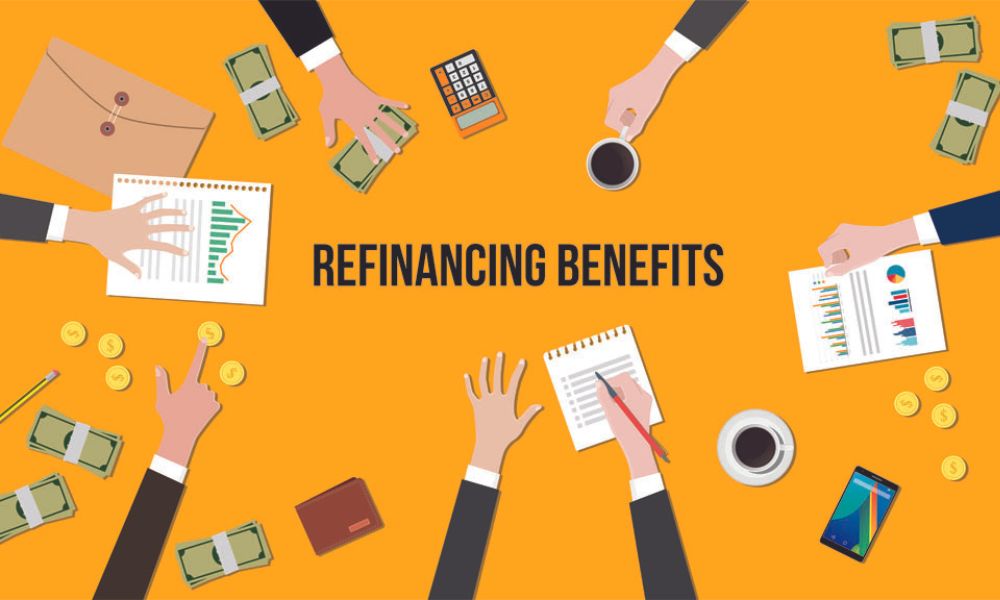Have you ever considered refinancing a business loan? Refinancing a business loan is a financial strategy that can provide a range of benefits for business owners. It involves taking out a new loan to pay off an existing loan or multiple loans, which can provide business owners with the opportunity to secure a lower interest rate and reduce the overall cost of their debt. Additionally, refinancing can also provide business owners with more flexibility in terms of repayment, which can improve cash flow and provide more financial stability.
In this article, we will discuss 10 benefits of refinancing a business loan that can help business owners make an informed decision about whether refinancing is the right choice for their business. From reducing interest rates to increasing cash flow, these 10 considerations can assist in pinpointing which option will work best for a business’s financial situation and long-term growth.

Whether you are a business owner considering refinancing, are looking for ways to improve cash flow, or are simply curious about the benefits of this financial strategy, this article will provide valuable information and insights. It is important to note that refinancing a business loan is a big decision and it is advisable to consult with a financial advisor or lender before making any decision. Read on to find out how refinancing a business loan could bring many financial advantages into reach.
1. Lower Interest Rate
Refinancing gives you the opportunity to reduce your interest rate, unlocking potential to save heavy amounts of money. Lower payments can be immensely beneficial, enabling you to use a larger chunk of your cash flow for multiple other crucial expenses. Furthermore, reducing the interest rate may also reduce the loan frame; this would mean that you save more money in the long run. If your credit score has improved significantly since you first applied for the loan, then refinancing is highly recommended. The lower interest rate may also make it easier to pay off your debt faster.

2. Improved Credit Rating
When you refinance, it shows that you’re taking an active role in managing your finances and that you’re financially responsible. This can help improve your credit rating, making it easier for you to gain access to additional financing if needed in the future. Many people find that their credit score has improved after they refinance their existing loan. As your credit rating improves, lenders may be more willing to work with you on other loans or lines of credit in the future.
3. Extended Loan Terms
Refinancing a loan can give you the ability to extend its terms, allowing you to pay off what is owed over a longer period of time. This means that each individual payment will be smaller than before but stretched out over a longer time frame. This could be beneficial for those businesses that need extra time to repay a loan but still want the ability to make progress on paying it off. By extending the terms of the loan, businesses can lower their monthly payments, which can free up cash flow and provide them with more financial flexibility.

4. Consolidating Debt
If you have multiple loans or debts under different lenders or credit cards, refinancing can give you the option to consolidate all of these debts into one loan with one lender at a single rate of interest, helping simplify repayment and make repaying debt much easier and more manageable than before. This could potentially save you a significant amount of money in the long run.
5. Accessing Equity
If your business has built up some equity over time from paying down its debt (or from market value increases), then refinancing provides an opportunity for businesses to access this equity without having to take out additional loans or financing products – potentially saving on fees associated with new borrowing products as well as interest rates in general. By using the equity offering to refinance, you could potentially gain access to extra funds without having to take on additional debt.

6. Freeing Up Cash Flow
Refinancing gives businesses the chance to free up their cash flow by reducing their monthly payments due on their existing loans. This leaves more capital available for reinvestment back into operations and growth opportunities as opposed to remaining tied up in debt service payments each month – helping accelerate overall growth potential in most cases. Lower payments can also help reduce stress associated with loan payments, enabling businesses to focus more on their core operations and strategic objectives. Refinancing can be a great way to free up resources for other purposes, enabling businesses to pursue new investments and grow in the process.
7. Tax Deduction Advantages
Many types of interest incurred on business loans are tax deductible – meaning that when businesses refinance they may be able to take advantage of deductions based on the amount they’re paying towards their new loan versus what they paid towards their old one; potentially providing greater savings long-term. It is important to speak with an accountant or tax advisor to ensure that you understand the full tax implications of refinancing before proceeding.

8. Flexibility & Leverage Opportunities
By opting for a variable-rate loan structure when refinancing, businesses may find themselves in a better position if interest rates drop again; giving them even further leverage when negotiating terms with lenders and potentially even going after reduced rates. Additionally, businesses may find themselves gaining access to more flexible repayment options when refinancing which could prove beneficial depending on specific operational needs at any given point in time (i.e., seasonal slowdowns, etc).
9 . Opportunity To Improve Loan Structure & Terms
Because banks tend to offer more competitive terms when lending large sums that are spread out over extended periods, borrowers may find themselves with more favourable repayment options following a successful refinancing process including extenuated payment periods as well as varied interest structures. This can give businesses an opportunity to tailor their loan repayment structure in order to best suit their current operational and financial needs.

10 . Outsourcing Negotiations Can Help Simplify The Process
Refinancing is no easy task; however there are third party services available now that specialise in helping facilitate such processes and negotiate favourable terms between lenders and borrowers alike – meaning less hassle and worry for those seeking such financial solutions. Working with an experienced professional can help make the entire refinancing process easier and less time consuming – potentially freeing up resources to focus on other aspects of business operations instead.

Carefully consider the many advantages and disadvantages of refinancing before making a decision for your business – it may not be the best choice in every situation. If you decide that refinancing is right for your company, compare offers from multiple lenders to get the best deal and ensure that you understand all of the terms and conditions involved. With careful planning and execution, refinancing can be a great way to improve your business’s financial position.

